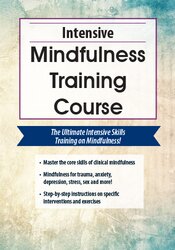Description
Watch this in-depth Mindfulness Training Course recording to develop a comprehensive, step-by-step approach to help your clients incorporate mindfulness practices into their daily routine and help you provide greater healing for your clients who suffer from:
- Trauma
- Depression
- Relationship challenges
- Toxic habits or beliefs
This course will provide you with detailed hands-on instruction on incorporating mindfulness into your treatment plans for the specific mental health disorders you see in your office each day. Full of structured and experiential exercises, interactive discussions, and case studies, you will take away practical strategies and reproducible handouts that are instantly usable upon your return to the office.
From intervening in the downward spiral of depression and anxiety to cultivating safety and groundedness in traumatized clients, you’ll learn the art of applying mindfulness insights, skills and techniques to a variety of clinical populations. Finish this transformational recording armed with the skills and tools you need to enhance your very next session!
Outline
MASTER THE CORE SKILLS OF MINDFULNESS
Treatment Concepts
- Introduction of mindfulness to clients
- Mindfulness as self-directed neuroplasticity
- Mindfulness as a skill-based path
- Reconsolidation of neural networks through mindfulness practice
Experiential exercise: self-regulation techniques
Strengthening Therapeutic Presence
- Benefits of therapeutic presence: presence, attunement, resonance, trust
- Stabilize the mind: the foundation of focus
- Self-regulation: the foundation of settledness
- Spaciousness: the foundation of openness
Five Core Skills of Mindfulness
- Clarify, set and re-affirm intention
- Cultivate witnessing awareness: metacognition
- Stabilize attention
- Strengthen self-regulation
- Practice loving-kindness for self and others
Experiential exercise: stability of attention and awareness
Neuroscience and Mindfulness
- Effective drivers of neuroplasticity
- Interpersonal neurobiology: importance of early experiences
- Formation of mental models: core negative beliefs
- Neuroception and the operation of the brain’s survival mechanisms
- Explicit and implicit memories
- Adaptive safety strategies: negative side effects
Experiential exercise: cultivate an inner refuge
Mindfulness Practices
- Themes in beginning mindfulness practice
- Am I focused or distracted?
- Am I settled/grounded or tight/churning
- Mindful transitions: a practice for new clients
- Stop-breathe-reflect-choose practice
- Development of client self-talk, scripts and mantras
- Positive visualization practice
- Cultivate a new vision of self: transform core negative beliefs
TRAUMA, ANXIETY, DEPRESSION, RELATIONSHIPS, ANGER, STRESS AND SEX
Mindfulness for Trauma
- Cultivate safety and groundedness
- Retrain the dysregulated nervous system
Experiential exercise: positive visualization
Mindfulness for Anxiety
- Witness the anxious mind
- Get unstuck from anxious rumination
Experiential exercise: self-regulation practices for anxiety
Mindfulness for Depression
- Transform core negative beliefs that power depression
- Cultivate motivation and action
Experiential exercise: develop behavioural plans with the client
Mindfulness for Relationships
- Clarify intentions that work in relationships
- Transform unhealthy patterns
Experiential exercise: cultivate positive experiences/exchanges
Mindfulness for Anger
- Understand the source of anger energy
- Identify the anger storm
- Clarify the practice when anger arises
Experiential exercise: rehearsal of the Stop-Breathe-Reflect-Choose practice
Mindfulness for Stress
- Educate the client about the impact of stress
- Change the stress reaction through practice
Experiential exercise: strengthen awareness of stress response, shifting to relaxation response
Mindfulness for Sex
- Create conditions for healthy and mutually satisfying sex
- Open to the full power of sexual intimacy
Mindfulness In-Session
- Avoid compassion fatigue
- Approach each session as meditative practice
- Counsel "in the flow"
Experiential exercise: path to enjoying our work more meditation practice
Research, Limitations and the Potential Risks of Mindfulness in Treatment
- Current state of research on mindfulness
- Limits of the current research
- Mindfulness-Based treatments – potential risks and limitations
- The importance of client evaluation
- Practices beyond your training and experience


 Online CourseFrank Anderson’s Master Class in Internal Family Systems Therapy£999.98Frank Anderson’s Master Class in Internal Family Systems Therapy29 Jan, 2024Frank Anderson’s Master Class in Internal Family Systems Therapy£999.98
Online CourseFrank Anderson’s Master Class in Internal Family Systems Therapy£999.98Frank Anderson’s Master Class in Internal Family Systems Therapy29 Jan, 2024Frank Anderson’s Master Class in Internal Family Systems Therapy£999.98 BookWritten by three leading experts in the fields of disordered eating, mental health, and trauma-informed care, this book will become your go-to guide for learning how to reject diet culture, heal your£18.99Written by three leading experts in the fields of disordered eating, mental health, and trauma-informed care, this book will become your go-to guide for learning how to reject diet culture, heal your20 Feb, 2024Written by three leading experts in the fields of disordered eating, mental health, and trauma-informed care, this book will become your go-to guide for learning how to reject diet culture, heal your£18.99
BookWritten by three leading experts in the fields of disordered eating, mental health, and trauma-informed care, this book will become your go-to guide for learning how to reject diet culture, heal your£18.99Written by three leading experts in the fields of disordered eating, mental health, and trauma-informed care, this book will become your go-to guide for learning how to reject diet culture, heal your20 Feb, 2024Written by three leading experts in the fields of disordered eating, mental health, and trauma-informed care, this book will become your go-to guide for learning how to reject diet culture, heal your£18.99









